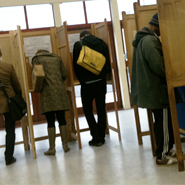Posted 08 May 2014
Report shows immigrants overlooked by political parties in local elections
The perception among political parties that immigrants are unlikely to vote in the upcoming local government elections has undermined commitments to integration within political parties, according to a new report.
In the last local government elections (2009) more than 40 immigrant candidates stood for election. About half represented political parties. About half were African in origin and about half were from Eastern Europe with most of these being Polish. At the time, within a number of political parties there seemed to be a rising enthusiasm for integrating migrants into the political system. Today, in the run up to the local government elections on 23 May 2014, some political parties seem to be making less of an effort to integrate the immigrant community.
“Very few immigrant candidates have been selected by Irish political parties for the upcoming local government elections,” said Professor Bryan Fanning, UCD School of Applied Social Science who co-authored the report, Inclusive Politics for a Diverse Society.
“Efforts to engage with immigrant communities appears to have declined. Debate about integration has dropped off the political radar and from the programmes of political parties.”
The new report highlights that there is no longer a Minister of State for Integration. It claims that Ireland’s large immigrant communities - who comprise one in eight of the population - are all but invisible within the political system.
This especially holds for the Polish community that, a decade after EU Enlargement, has become Ireland’s largest immigrant community and linguistic minority. According to the 2011 census Poles now make up more than two and half percent of the population of the Republic of Ireland.
“The likely outcome of the 2014 local government elections is that only a small number of immigrants will be elected as councillors. Immigrant political representation in the Dail seems a long way off,” added Professor Fanning.
“It is crucial that immigrants turn out to vote in order to challenge the prevailing perception within a number of political parties that they can be ignored.”
Barnaba Dorda of Forum Polonia, the immigrant-led organisation that commissioned the research said: “There are considerable challenges in engaging the Polish community in the political process and the likely long term marginalisation of Ireland’s largest immigrant community from the political system is a matter of grave concern. Beyond encouraging immigrants to vote it is crucial that mechanisms are put in place to ensure that local government is responsive to Ireland’s diverse communities.”
Agnieszka Wieczorkowska, an Independent candidate standing for Dublin City Council, said: “In my opinion, diversity is a value and it is absolutely necessary to build an open and modern community. I would like to see more women and migrants involved in Irish political life. It is our civic duty to participate in the electoral process and people should be aware of their voting rights. We should and we need to participate in the decision making process that affects our local community. As a councillor I want to represent all citizens of our area. I would like to respond to our local needs and concerns, improve the general development in our area and make our local community a better place to live in.”
Rafal Kornatka (also standing as an independent candidate for Dublin City Council) said: ‘I want to work to create a better life for my local community. My aim is also to build a positive image of the Polish community in Ireland. I believe that as a councillor I will have a real impact on the life of my community and the city as well. I want to utilize my skills and experience to provide help and assistance on individual and community issues’.
The launch of the report, Inclusive Politics for a Diverse Society, coincides with training organised by Forum Polonia and School for Leaders Association for activists encouraging migrant communities and Irish citizens to vote in May local and European Parliament elections. The campaign "Vote! You are at home" based on a Polish model that was started in Ireland last year has now inspired activists in Belgium, France, Hungary, Italy, the Netherlands, Spain and UK and is spreading throughout Europe.
The full report is available to download.
(Produced by UCD University Relations)

